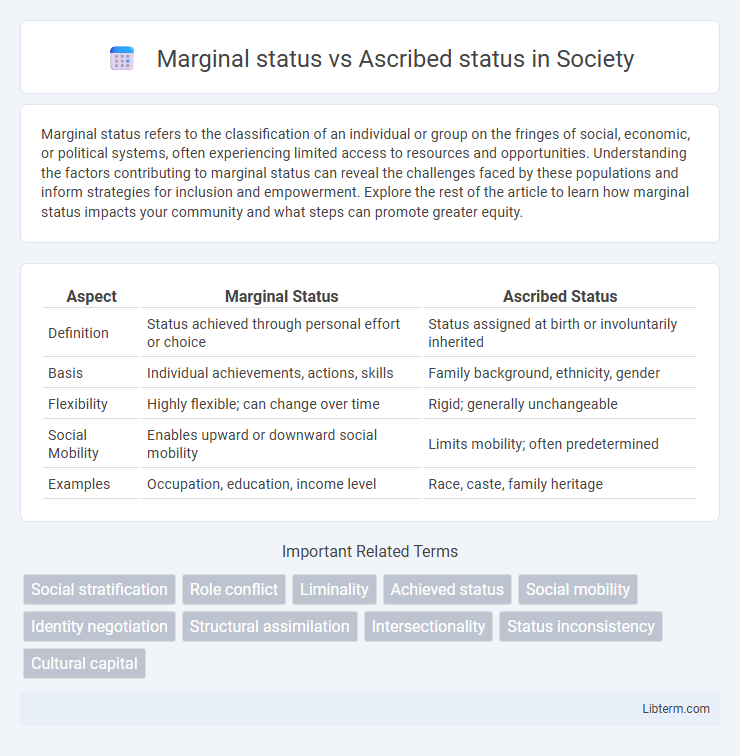Marginal status refers to the classification of an individual or group on the fringes of social, economic, or political systems, often experiencing limited access to resources and opportunities. Understanding the factors contributing to marginal status can reveal the challenges faced by these populations and inform strategies for inclusion and empowerment. Explore the rest of the article to learn how marginal status impacts your community and what steps can promote greater equity.
Table of Comparison
| Aspect | Marginal Status | Ascribed Status |
|---|---|---|
| Definition | Status achieved through personal effort or choice | Status assigned at birth or involuntarily inherited |
| Basis | Individual achievements, actions, skills | Family background, ethnicity, gender |
| Flexibility | Highly flexible; can change over time | Rigid; generally unchangeable |
| Social Mobility | Enables upward or downward social mobility | Limits mobility; often predetermined |
| Examples | Occupation, education, income level | Race, caste, family heritage |
Introduction to Marginal and Ascribed Status
Marginal status refers to an individual's social position that is ambiguous or intermediate, often occurring when a person belongs to two distinct social groups but is fully accepted by neither. Ascribed status is a social identity assigned at birth or involuntarily later in life, based on characteristics like race, gender, or family heritage, and often shapes an individual's opportunities and social interactions. Understanding these concepts highlights how social belonging and identity are influenced by both inherited traits and the complex dynamics of social integration.
Defining Marginal Status
Marginal status refers to an individual's position at the intersection of different social groups, often resulting in limited acceptance or ambiguous identity within either group. Unlike ascribed status, which is assigned based on birth traits such as ethnicity, gender, or family background, marginal status emerges from social interactions and situational contexts. This status can lead to unique challenges in social integration and identity formation.
Understanding Ascribed Status
Ascribed status refers to the social position assigned at birth or involuntarily later in life, such as race, gender, or family heritage, which significantly influences one's identity and social interactions. This status is typically fixed and difficult to change, shaping opportunities and social expectations within a community. Understanding ascribed status is crucial for analyzing social stratification and the persistence of inequalities rooted in societal structures.
Key Differences Between Marginal and Ascribed Status
Marginal status refers to an individual's position on the edges of social groups, often characterized by limited acceptance and restricted access to resources, whereas ascribed status is assigned at birth based on attributes like race, gender, or family background without regard to personal achievements. The key differences lie in the basis of status acquisition--marginal status emerges from social positioning and interactions, while ascribed status is predetermined by societal norms. Furthermore, marginal status can change over time through social mobility, whereas ascribed status remains largely fixed and influences life opportunities and social identity.
Social Implications of Marginal Status
Marginal status refers to individuals or groups positioned at the edges of social structures, often experiencing limited access to resources, power, and opportunities compared to those with ascribed status, which is assigned at birth and difficult to change. Social implications of marginal status include increased vulnerability to social exclusion, discrimination, and economic disadvantage, leading to reduced social mobility and perpetuation of inequality. These conditions often hinder full participation in societal institutions, exacerbating issues of marginalization and social fragmentation.
Impact of Ascribed Status on Identity
Ascribed status profoundly shapes individual identity by assigning roles and expectations based on characteristics like race, gender, or family heritage, often limiting personal autonomy and social mobility. This predetermined social position influences self-perception and societal interactions, embedding individuals within specific cultural norms and power structures. The impact of ascribed status on identity underscores the challenges faced when negotiating personal agency within rigid social hierarchies.
Factors Influencing Marginal Status
Marginal status arises when individuals or groups occupy a social position between two distinct cultural or social systems, often leading to social exclusion or identity conflicts, unlike ascribed status, which is assigned at birth based on attributes like race or family heritage. Factors influencing marginal status include cultural displacement, economic hardship, and social discrimination that limit access to resources and full societal participation. Understanding these factors is crucial for addressing social integration challenges and promoting inclusive policies.
Cultural Perspectives on Ascribed Status
Ascribed status, determined by factors such as ethnicity, gender, and family heritage, profoundly shapes an individual's identity and social roles within various cultures. Marginal status arises when individuals or groups experience social exclusion due to conflicting or ambiguous ascribed statuses, leading to limited access to resources and opportunities. Cultural perspectives on ascribed status emphasize its influence on social stratification, highlighting how inherited characteristics can reinforce power dynamics and social inequalities.
Marginalization and Social Mobility
Marginal status occurs when individuals or groups are excluded from full participation in social or economic systems, often leading to social marginalization characterized by limited access to resources, opportunities, and networks. Ascribed status is assigned at birth based on characteristics such as race, ethnicity, or family background, which can restrict social mobility by reinforcing systemic barriers. Social mobility is influenced by the interplay between marginal status and ascribed status, where marginalized groups struggle to move beyond their prescribed social positions due to entrenched discrimination and lack of institutional support.
Overcoming Challenges of Status Assignment
Marginal status arises when individuals navigate conflicting social groups, creating challenges in identity affirmation, while ascribed status is assigned at birth without personal choice, often limiting social mobility. Overcoming challenges of status assignment involves fostering inclusive social networks and promoting merit-based recognition to break down rigid barriers imposed by ascribed statuses. Empowering individuals through education and community support enables transcendence of marginalization and the redefinition of social identity.
Marginal status Infographic

 libterm.com
libterm.com